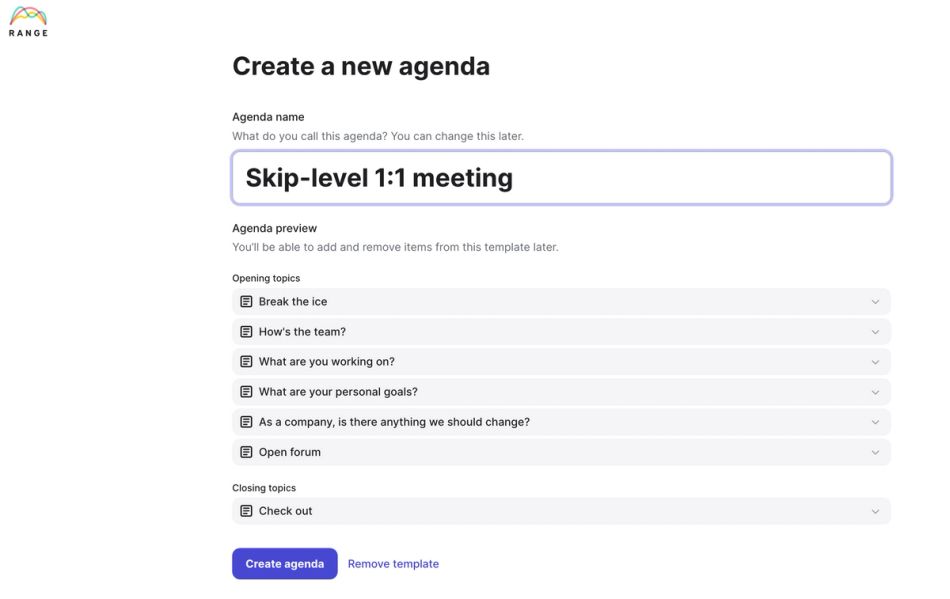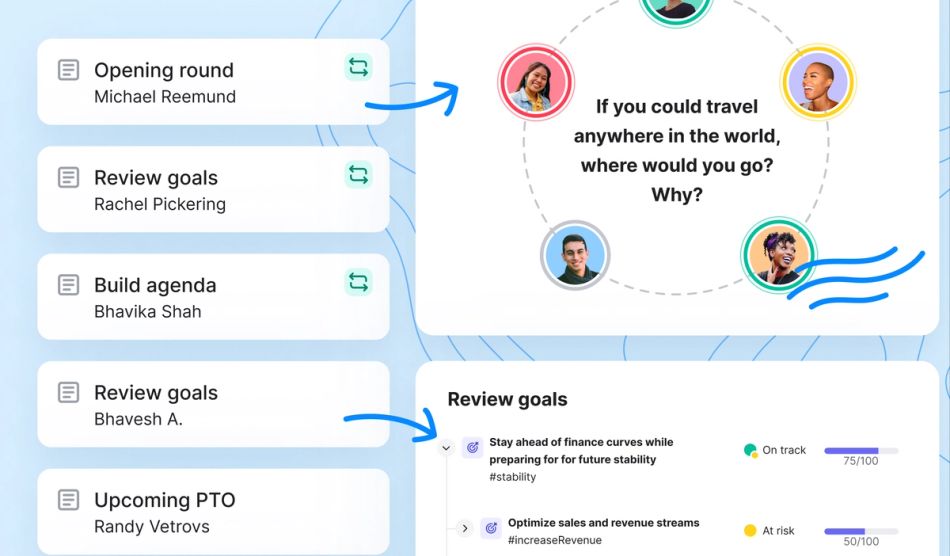If you haven’t already, you’ll likely be involved in skip-level meetings at some point in your career. You may have even participated in one without knowing what it was called.
What is a skip-level meeting? In simple terms, a skip-level meeting is a one-on-one meeting between a team member and their boss’s boss.
Whether you’re a team member or the manager, it’s important to prepare for these meetings in advance and have some thoughtful, insightful questions to ask and answer.
This ensures that the meeting is as productive and valuable as possible, making it a good use of everyone’s time.
Below, we’ll outline more details about skip-level meetings, how to conduct them, specific questions to ask, and what team members can expect to gain.
Try a skip-level meeting in Range. Free to sign up.

6 tips for conducting a skip-level meeting
If this is your first time participating in a skip-level meeting, know that it can be nerve-wracking for the front-line employees.
They may feel intimidated by the prospect of meeting with their manager's manager, or may not feel comfortable because they don’t have an established relationship with the higher up.
As with any effective meeting, both parties should prepare. The purpose of skip-level meetings is typically multifaceted.
- Senior leaders want to build better relationships with lower-level employees, establish rapport, and make them feel valued.
- On the other hand, team members want to use facetime with the senior leader to share ideas, make a good impression, and discuss areas of improvement.
Whether you’re the manager or the team member, creating a positive outcome for these meetings is easier if you plan ahead.
Here are six tips for managers and team members to help conduct more successful skip-level meetings.
1. Be open and honest
Now is not the time to be vague or shy. While you don’t want to turn a skip-level meeting into a whine session, outline issues hindering effectiveness and share ideas for improvement.
Team members should feel free to share how they feel about their jobs and what they hope to achieve in the long term.
Focus on the information you don’t share in team meetings. Be honest and authentic while maintaining professionalism.
2. Think of concrete talking points
Have you ever had an opportunity to speak up, and your mind went blank? It’s happened to the best of us.
Avoid this issue by thinking about the topics you want to discuss in advance. Run through your recent achievements, projects you’ve been involved in, who you’ve worked with, and any roadblocks you’ve encountered.
Take meeting notes if you want to be sure to remember them.
Ask your boss’s boss for a skip-level meeting agenda to prepare further. This way, you know which topics they want to address and can be ready for the conversation.
3. Take meeting notes and provide feedback for your team
Follow-up is important with skip-level meetings. If a team member’s feedback never gets addressed, they may feel like the meeting wasted their time. Worse, they may not be as willing to share their thoughts in the future.
As a company leader, take notes and review them carefully, then create a list of takeaways from the meeting.
It’s also a good idea to bring the team member’s direct manager into the mix - this provides transparency and is a valuable opportunity to share the insights learned from their direct reports.
Be careful to keep these feedback conversations positive.
Skip-level meetings aren’t designed to get people in trouble: They’re a tool that improves communication flow and builds better teams and better leaders.
4. Consider doing a skip-level meeting over lunch
Instead of awkwardly eyeballing each other over a desk, consider holding skip-level meetings at an off-site location during lunch. Choosing a more casual meeting space will help you and the team member relax and let down your guards. Plus, restaurants won’t have co-workers interrupting the meeting.
Chat and order food, then go over the agenda template and your goals for the meeting. This more casual approach will hopefully evoke a more forthcoming, honest conversation without the confines of the work environment.
5. Discuss future goals and milestones
When filling in your meeting template, start with the team member’s job and responsibilities. Don’t miss the opportunity to highlight how their efforts are part of the company’s broader initiatives and plans.
Share the company’s future goals and milestones and explain how the team member’s contributions fit into that plan’s success.
Conversations like these can boost morale and improve team member engagement.
Team members who see the direct correlation between their work and the company’s viability are more likely to work harder, be more resilient, and find ways to increase efficiency and productivity.
6. Keep the skip level meeting friendly
A confrontational and antagonistic attitude will throw off the meeting and eliminate any hope for a positive outcome. Remember to be friendly, supportive, approachable, and inviting.
If the team member gets angry or brings up a sore point, acknowledge their feelings and opinions and redirect the conversation to keep it from straying into negative, unproductive territory.
Even if it gets heated, remember (and reiterate to the team member) that the meeting’s goal is to increase communication, establish rapport, and maintain employee engagement.
8 great skip level meeting questions to ask
You probably already know how to run team meetings, but these are different. They are more intimate.
One of the biggest benefits of skip-level meetings is that managers and team members who don’t interact often get a chance to build relationships and understand each other better. Deciding on some opening questions before the meeting avoids the uncomfortable silence of not knowing what to say.
Thoughtfully choose the questions based on the individual, their role, how well you already know them, and the specific information you believe needs discussing.
Avoid rapid-fire questioning during skip-level meetings.
After all, the teammate is probably already nervous. Instead, work questions into the conversation organically as opportunities arise.
If you’re unsure where to start, here are some of our favorite skip-level meeting questions and what information you can gather from each one.
Question 1: What projects have you enjoyed the most?
Understanding what the team member likes about their job gives you insight into their talents and strengths. As new projects and opportunities arise, this knowledge can help you know which teammates would be excited about tackling those roles.
Question 2: What is your favorite hobby or activity?
This is a great icebreaker question that puts the team member at ease. Plus, if you find you have a hobby in common, it’s a fast way to build rapport!
Question 3: What are your most significant work challenges?
If a team member is dissatisfied or unhappy, you should know about it. Perhaps they don’t feel comfortable talking about it with their direct manager, but the last thing you want to do is let negative feelings smolder. This question opens the door to find ways to address these challenges and reduce turnover.
Question 4: What are your goals for the next 3-5 years?
Where does the individual see themselves in your company over time? Do they want to stay in the same department? Are they interested in management? This question helps identify passionate talent that may be tomorrow’s leaders. When you know about these ambitions you can develop and foster them, which reduces your chances of losing these team members to other companies.
Question 5: How could we better leverage your skills?
Knowing the team member’s perception of their skills and strengths guides you in future decision-making about the team. They may have untapped skills that could be beneficial in future projects, or a wealth of niche knowledge that could lead them to come up with ideas you’ve never thought of.
Question 6: What would you do differently if you were the manager?
The team member may close down if you ask a more direct question about their supervisor. However, this question is an open-ended chance for team members to offer their opinions about how their boss could improve. The answers can guide you as you coach your direct report (the team member’s manager in a skip-level setting).
Question 7: Do you know how your role supports the company goals?
Many times, there’s a disconnect between a team member’s daily tasks and their ability to see how they contribute to the company’s overall objectives. Their answer to this question clues you into whether they understand their direct link to company goals. If not, you need to make an effort to help them realize it.
Question 8: How can we help you work with your manager?
It’s always valuable to understand what a team member needs to do their job more productively, efficiently, and happily. Make note of the feedback you receive, keep track of any trends, and use this information to proactively address issues that could snowball later on.
Fuel high-performing teams by hosting more effective meetings with Range
Hosting skip-level meetings is a great way to check in on current team members and ensure they are content and engaged within their current roles. It also helps uncover burgeoning issues with productivity that higher-level managers may not see.

By implementing best practices and preparing in advance, skip-level meetings can be a valuable resource for team members at all levels.
Want to create more effective asynchronous meetings?
Range makes it easy to stay in the loop, helping avoid obstacles that drain your team’s time and resources.
Start with a free skip-level meeting agenda template in Range.
Skip-Level Meetings FAQ
What is a skip-level meeting?
A skip-level meeting differs from a performance review or a check-in meeting. As we touched on above, a skip-level meeting is a sit-down with a team member and their boss’s boss. That's right: The team member’s direct supervisor is not present during a skip-level meeting.
Skip-level meetings help senior stay in tune with the more granular tasks and daily activities within the organization that they may not participate in. These meetings may also uncover obstacles and issues the manager wasn't aware of (like customer service complaints).
In addition, skip-level meetings are a way for team members to get to know their manager’s manager, helping them build trust in their position and giving them a platform to express their opinions.
What can an individual contributor expect from a skip-level meeting?
While anticipating a skip-level meeting can be stressful, it helps to adjust your perspective. Instead of viewing it as an intense critique session, look at it as an opportunity to solidify yourself as a team player.
Knowing what to expect out of a skip-level meeting helps you prepare and keeps your nerves calm.
While meetings will vary between companies and managers, there are four elements that you can expect from most skip-level meetings:
Chit-chat
Instead of thinking you’ll dive straight into team goals and plans, be ready for some small talk (https://www.themuse.com/advice/your-foolproof-formula-for-making-small-talk-that-doesnt-involve-awkward-silences). A few minutes of personal banter discussing your hobbies, interests, vacation plans, sending kids to school, and other non-work topics helps break the ice and sets the tone for a positive meeting.
Being asked to share your perspective
How you view your team, management, and the company is unique to you! The manager will undoubtedly ask about your thoughts and opinions. Be honest and clear while keeping your comments as diplomatic as possible.
Offering ideas for improvement
They wouldn’t be taking the time to meet with you if they knew everything was perfect - and, by the way, nothing ever is. Be ready to share a few areas that you would like to see improve. However, avoid going on about this for too long, or you may start to sound like a complainer.
Getting feedback
Communication is a two-way street during skip-level meetings. Expect feedback about your thoughts and comments. If you don’t get any, ask for it. Remember, these meetings are as much for team members as they are for management!
What's the best skip-level meeting template? 
Range offers a skip-level meeting template that you can use for free.
With Range, you can:
• Create dynamic agendas in real-time
• Create action items to share later
• Share & send meeting notes directly after the meeting
Get your free skip-level meeting template.








